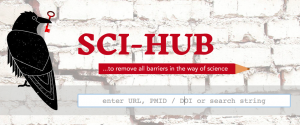So… do I dare google for Sci-Hub, to see for myself what it is all about? I know it is a site that illegally offers more than 60 million scientific papers, grabbed from behind the publisher’s paywalls and libraries’ authentication screens and offered to be downloaded for free. I also know that its founder Alexandra Elbakyan has been featured on Nature.com as one of 10 people that mattered in 2016 [1]. If everyone’s using it or is at least checking it out, shouldn’t I be allowed a little peak?
Sci-Hub.org started in 2011 when Elbakyan decided to help others with her skills to circumvent legal access when she could not get or afford to pay for the articles she needed for her own research project. In 2015 she got sued by Elsevier which led to her losing the Sci-Hub.org domain [2]. However, Elbakyan would not give up, motivated by weekly thank-you notes, some with financial support [1] and supportive tweets [3], she moves to other domains when necessary.
An online survey by Science Magazine last May, showed that only 12% of the more than 10,000 respondents thought it is wrong to download pirated papers and 59% of the respondents admitted to having done so a few times (33%) or even daily / weekly (26%) [4]. And it’s not just people who don’t have access. Even scholars who’s institutional or academic libraries pay heavy license fees to offer the content through their websites or Discovery systems, still seem to prefer the easy, hassle-free Sci-Hub, or simply want to support the pressure piracy sites put on publishers to move towards open-access business models.
I dare. The user interface is in Russian, but it’s so easy to use there is no need to translate. I copy-paste a DOI from an article (2016) related to a project I am working on and in less than a second, there it is. One click, no messy splash page. Just the content. OK, I get the appeal. The only English button asks me to donate with Bitcoin.
One more example of how scientific readers are taking control is #ICanHazPDF a popular hashtag on Twitter. When you want an article you can’t access, you tweet the DOI or URL with this hashtag and wait for one of your followers to mail it to you. Then you are supposed to delete the tweet… [5]. This practise is not always piracy, as the article you get might be a preprint or the author’s version, legitimately published in green OA in an institutional repository. Or you might get it directly from the author, a common practise that is allowed by most publishers, see for example Elsevier’s Sharing Policy [6]
Open Access as a default, we are working hard to get there. Libraries will try to maintain a relevant collection for its patrons, but cannot afford to provide access to all scientific content that is wanted or needed. In the meantime: be open, publish open access yourself and if you cannot access what you need: try document delivery / Inter Library Loan. We do not promote piracy, but we need to be aware of what is happening globally and how that is affecting the scientific community. We’ll keep you informed.
[1] – http://www.nature.com/news/nature-s-10-1.21157 – accessed 20-1-2017
[2] – https://en.wikipedia.org/wiki/Sci-Hub – accessed 20-1-2017
[3] – http://www.nature.com/news/paper-piracy-sparks-online-debate-1.19841– accessed 20-1-2017
[4] – http://www.sciencemag.org/news/2016/05/survey-most-give-thumbs-pirated-papers – accessed 20-1-2017
[5] – https://en.wikipedia.org/wiki/ICanHazPDF – accessed 25-1-2017
[6] – https://www.elsevier.com/about/company-information/policies/sharing – accessed 25-1-2017


Karin, ik liep eerder vandaag tegen “deepdyve” aan en merk wederom op dat er steeds meer alternatieve kanalen komen om aan scientific content te komen (“delivery”). Is het een idee om daar een cheat shet of “plattegrond” van te maken met “how to” en “do’s and don’ts”? https://www.deepdyve.com/
Een interessante en weinig bekende bron op dat naarstig verder te onderzoeken terrein is denk ik ook http://emeraldinsight.com/toc/idd/45/1 en haar voorganger http://emeraldinsight.com/journal/ilds
Further reading: article by Andrea Zanni Academic publishing, Sci-Hub, and the Ring That Rules Them All.